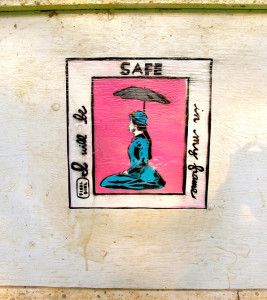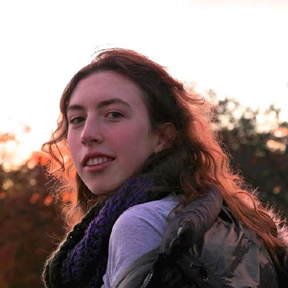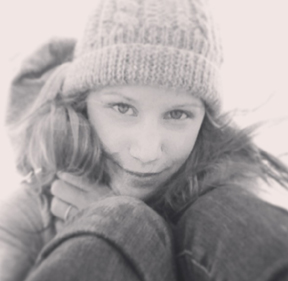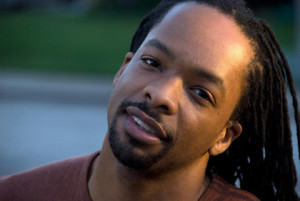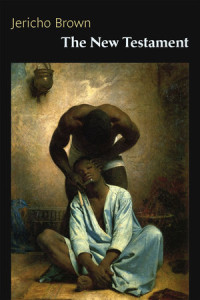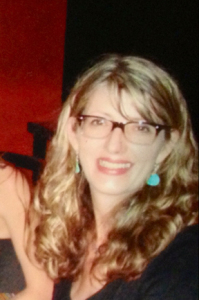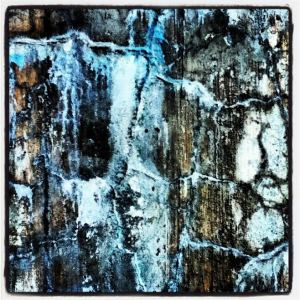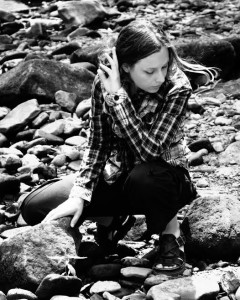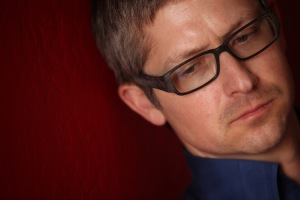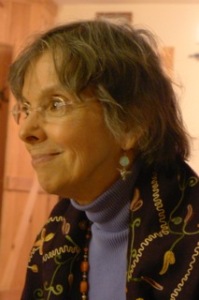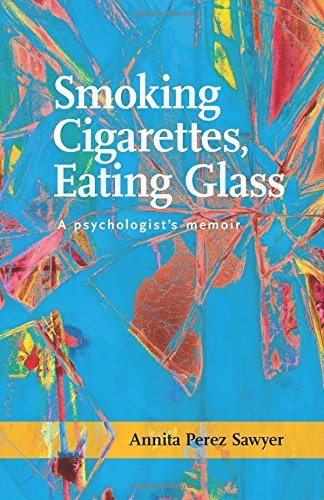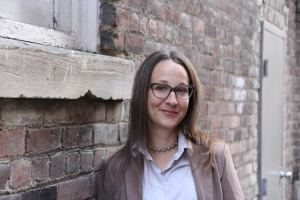
Mary Akers: Hi, April. Thanks for agreeing to talk with me today. I’m so excited to discuss your forthcoming collection, The Poor Children. First of all, wow. Let me just say that your stories are so unsettling—in the best way. I do like a good, dark, freaky story, and I’ve often wondered what in my formative years made me this way—did I come out of the womb primed to love Poe and Plath? What were some of your earliest influences? And I’m talking about before you even conceived of being a writer yourself. For the sake of a concrete number (and so none of your current literary heroes can be jealous), let’s say the age of twelve. What were you reading when you were twelve?
April L. Ford: Thanks for inviting me, Mary! Since this is my first experience having a book published, I feel soothed being in your company—like a little girl grabbing onto a grownup’s shirt hem, pleading, “You won’t let them hurt me, right?” Which is strange (or maybe apt?) of me to say, I guess, given the nature of The Poor Children.
Age twelve, eh? Well, I was a late bloomer in terms of “real” literature; I was still reading young adult novels about horses. I was an avid horse-lover (still am!), and until seventh or eighth grade, I refused everything that wasn’t about horses. I must have read Walter Farley’s The Black Stallion series, all twenty books, cover to cover a dozen times by age twelve. I could also recite Anna Sewell’s Black Beauty from memory. The scene in the novel that drew me back time after time was where Black Beauty sees his old carthorse friend Ginger being taken away:
“A short time after this a cart with a dead horse in it passed our cab-stand. The head hung out of the cart-tail, the lifeless tongue was slowly dropping with blood; and the sunken eyes! but I can’t speak of them, the sight was too dreadful. It was a chestnut horse with a long, thin neck. I saw a white streak down the forehead. I believe it was Ginger; I hoped it was, for then her troubles would be over. Oh! if men were more merciful they would shoot us before we came to such misery.”
I was rightly horrified, imaging any horse I loved ever dying, but there was something about that scene…a connection I made to reality and the things beyond my control. I wanted to understand. I became obsessed with understanding.

MA: I’m curious: Why children? Why troubled, disadvantaged, marginalized, sexualized children? I don’t mean that as a glib or disparaging question–I find the subject compelling and fascinating and delightfully taboo, especially in today’s child-centric society, and I’m guessing I will find your answer equally compelling and fascinating.
AF: The short answer could be that I’m stuck somewhere in my teens, emotionally, although I was never that terrible. The more comprehensive answer includes facts like, I was an only child with a limited social circle, so I had lots of time to watch other kids and make inferences. Also, I hated being a kid. I felt chubby and awkward and weird, and I wanted to crawl out of my skin at the first chance. By adolescence, after I toned down on my horse books, I picked up VC Andrews and suddenly people became interesting. Parents were evil, siblings were malicious, and everyone did all-around terrible things. I loved it! Beneath those terrible things, there were always explanations; people were the way they were because of circumstances, and those circumstances made the characters in the novels more…acceptable, I guess. I would root for the evilest of the characters, because somewhere in the stories, they would be redeemed, even if only for a paragraph. Those redemptions helped me understand people weren’t only good or only bad; people—children included—made choices that often reflected their situations before their personalities.
In the last year and a half of my teens, I lived in a group home with seven other kids. Those kids had all come from severely deteriorated family situations, whereas I had come from a relatively stable upper-middle class environment that sort of fell apart at the last minute. So suddenly I had seven new siblings, boys and girls, and they were pretty dangerous creatures—drug dealers, violent, etc. Take a kid with a curious mind from a very sheltered life and plunk her at the center of constant danger and chaos, well, it was like living in a human library! I made friends with some of the kids, while others didn’t want anything to do with me. In a sense, the group home was where I learned how to make friends, socialize, behave with my peer group. Other kids my age had been either uninteresting or mysterious to me before then, so the world of the group home, and the community around troubled youth, cracked open a whole new compelling purpose for me.
MA: Wow. I sensed that there was some lived experience behind your characters—they felt so real!—but I also know (intellectually) that fiction is made-up-shit. I mean, I really am an author. I know this. But I still get sucked in as a reader (and I hope to never lose that). So…(no segue intended)…do you think writers write from their obsessions? (Spoiler alert: I do.) If so, do you think that the writing is one way we tame our obsessions? If not, what the hell DOES make us write?
AF: Definitely! And I think obsessions vary from project to project—we can be obsessed with a particular theme or idea, or a character, or we can fixate on syntax as a way of telling a story. When I wrote “A Marmalade Cat for Jenny,” I was obsessed with the Southern accent—you know, that overused Texas drawl? I had just watched Million Dollar Baby on the big screen, and I wanted more than anything to sound like I was from the South—which was a totally bizarre thing to wish for, since I was a French-Canadian who had lived in Quebec her whole life. Anyway, that obsession with the sound of language, and dialect, drove me through the first draft of the story. And what a mess it was. No “g’s” on words ending in “ing,” “w’s” after every end vowel I could get away with, “your” spelled as “yur,” “for” as “fer.” I even read the opening scene of the story at an open mic in dialect! Oh, man, what was I thinking? I mean, the narrative itself was in pretty good shape, but more than one person told me to tone it down with the visual spelling. Years later, I submitted a cleaned-up version to The Missouri Review. An editorial assistant wrote back and asked for a revision. The readers really like the story, he said, but something wasn’t quite right…maybe the dialogue? By then I had limited the dialect to direct speech, but even that proved too heavy. And who turns down a request for revision from TMR? The Journal didn’t accept my story, finally, but I still consider that exchange an exciting and defining moment along my way as a writer. I might have pressed the handwritten note from the editorial assistant between the pages of a favorite book, the way a person presses a first rose from a lover for safekeeping….

MA: Pressed the handwritten note—I love that. The things we cling to are things no non-writer would ever understand. Speaking of clinging to things, I loved your story “Isabelle’s Haunting.” Such delicious details, such a strange Miss Havisham-type setup (minus the cobwebs and wedding cake). I’ve had occasion of late to consider what makes a work “haunting.” You might even say I’m obsessed with figuring out what makes a particular piece of writing haunting. So…what, for you, makes a story “haunting?”
AF: Oh, great question! Here, I would say less is more. Part of what makes something haunting is the mystery that surrounds it, and the suspense of not knowing whether we’ve drawn the right conclusions. Little nibbles along the way to help us build a picture in our minds, but an opaque picture—an impression. When we’re kids, all sorts of undefined things frighten us; we see something vague, like the silhouette of a sock on the hallway floor at night, and then we form a concrete explanation for it, the sock is really a snake, and that explanation haunts us. When I started “Isabelle’s Haunting,” I had no clue where the story was going, and I didn’t plan for it to be a tale of haunting. After romance, horror is the genre I have the least experience with as a reader. I just know I liked the idea of never fully explaining what happened to Isabelle, and in order to pull that off, I had to deny myself certain concrete facts about Fancy. Maybe that sounds weird, so many writers say they make all kinds of character or plot notes before digging into a piece, but I wanted to feel the tension as I wrote the story. I wanted every new scene and development to surprise me as much as I hoped they would surprise readers.

MA: I think that’s a brilliant response. The unknown is definitely haunting…and our empty assumptions often even more so. You’re so smart.
Now, indulge me if you will, and take us forward to a packed room where you are giving a reading from The Poor Children to an eager and attentive crowd. First, what are you wearing? (I never know what the hell to wear and usually spend the last two hours before a reading trying on and tossing a mountain of clothes before giving up and going back to my original outfit.) Second, how are you pronouncing your title? I know the many inherent meanings are part of the joy of a good title, but I want to know how you say the title when speaking to your audience. The POOR (poverty-stricken) Children? The Poor (non-adult) CHILDREN? THE (one-and-only) Poor Children? The Poor (awww!) Children? Come on, spill.
AF: Your question is timely, Mary! Just yesterday I was at the mall with my spouse, trying on a variety of dresses I might wear to a reading. I left the mall empty-handed and dispirited, though, and unless I find something spectacular between now and March seventeenth, the date of my first reading, I’ll likely appear in a swank pair of Montreal designer jeans, a button down, a blazer with slightly too-long sleeves, my awesome high-heeled Doc Martens, and a fanny pack of nerves.
You are my new favorite person for asking about pronunciation! Back when I came up with the title, which involved a lot of me spouting possibilities to my spouse and asking his opinion, I really-really wanted something that would fit every story in the collection and also suggest how I feel about the characters. I wanted something literal and sarcastic. When I spouted, “The Poor Children!” my spouse and I looked at each other and knew, we just knew, that was it. There’s poverty throughout the collection, and I wouldn’t wish any of those characters’ experiences on a real person. And then there’s the reality of those characters: they’re bright, they have agency, and they believe they know what they’re doing (which is a universal flaw we all share), so should we really say, pityingly, “Oh, those poor, poor children”?
MA: Even with my high tolerance for characters who have grim life prospects, I found one of your stories so dark and unsettling that there were times when I had to look away from the page. I felt complicit somehow and it made it hard to go on reading until I talked myself down with the “It’s fiction, silly!” pep talk. I’m guessing you know which story did that to me (cough-cough-MarmaladeCat-cough-cough). I do appreciate stories (and all forms of art) that make me squirm. I wonder, though, do you squirm while writing them? Do you ever have to look away? And a related question: How do you know when/if the reader’s line gets “crossed?”
AF: I expected that story would be forever archived on my hard drive, in a “Stories You Should Never Write” or “Stories You Should Never Tell Anyone You Wrote” folder. I knew, while I was writing the opening scene, which came to me fully and lucidly one night while I was waiting for friends to join me at a restaurant, no one would pat me on the back for it. Readers, if the story ever made it to that point, would judge me based on that opening scene, and I might get labeled as a certain kind of writer. But I went forward with the scene, and with the rest of the story, because I had to. I had to get into that world to understand why in hell anyone would do those things. In the same way I kept rereading the death scene in Black Beauty to fathom death in a world where I had never experienced any, I had to cast aside my biases and judgments to get into the world of Scott, Jenny, and Mark, and give them a chance to show me why they lived that way.
It’s not an easy story to read, I’m well aware of this, but then I didn’t write any of the stories in The Poor Children with “easy read” in mind. Returning to the idea that no one is only good or only bad, I wanted this to be a major question in the collection. As a reader, you might hate Scott, or Derrick, or Madame Jasmin, but are you able to investigate their situations before passing judgment? Are these characters gross magnifications of ourselves? So what if they are? Better to read it in a novel than to live that life. I mean, we watch or read about horrific world events all the time, and then we squabble about them on Facebook like they’re nothing when in fact they’re huge things: they’re people’s lives. Someone once accused me of punishing readers with my stories, and I will defend myself tirelessly against that one. I’m not trying to punish anyone, not even the characters who meet unpleasant ends. My only goal is to tell stories. Difficult ones, yes, but reading them doesn’t make us any more or less complicit in tragedy than when we watch the six o’clock news, or Google the latest stats on Ebola. I’ve certainly felt offended by fiction, and like anyone, I’ve had knee-jerk reactions of anger toward authors for their work. That’s normal; it’s the mark of effective writing—writing that makes us think a little more with our hearts, if we’re willing to go there. And if we’re not, it doesn’t mean we’ve failed as readers or the authors have failed as writers. Some days, all I have the appetite for is a Peanuts comic strip re-written with song lyrics from The Smiths.
MA: Yes, effective writing for sure. Also affective writing (in the psychological sense). I love your answer.
And finally, because I adore this question and because everyone’s answer is so different and because it makes a damn fine final question especially for the author of The Poor Children, What does “recovery” mean to you?
AF: “Affective,” indeed!
The Poor Children stories are about people who don’t, or who can’t, recover. Their worlds are severe, and the consequences of their choices are unforgiving. It took me eight years to put the collection together. I wrote other things during that time (poems, essays, a novel), and they tended to be much lighter, to the point of goofy, because I needed balance—it wasn’t a conscious decision, “Now I’m going to write a comedy piece about a woman coming to terms with her hemorrhoids,” it was my psyche screaming for fresh air.
Last June, when I received a galley of The Poor Children to approve, I thought my writing career was over. My own work looked entirely foreign to me. It was my first time seeing the stories in book format, snappy cover image and all, and I didn’t know how to react; I knew I should be somersaulting with joy, but until that point I had thought of the stories as separate parts, and seeing them neatly bound as one, all these “big ideas” compressed into a book I could fit on a dinner plate, terrified me. “Here’s your son, ma’am. Best of luck.” I was responsible for something I had created, cliché though it sounds, and I felt the impulse to throw it in the trash like that six o’clock news mother who abandons her newborn in a dumpster. I didn’t, of course, but it took one week, plus a long telephone conversation with my publisher, and then my copyeditor, and then a friend who had been through the whole first-book experience, before I was ready to read The Poor Children the way readers eventually would.
Since then, my recovery from The Poor Children has involved relinquishing control over what happens to the collection next. I’ve had to let go of those characters and worlds I carried inside me like organs. Now, reviewers and critics have to say, “We’re going to build the book up this way,” or, “We’re going to tear it down that way,” and readers have to say, “Let us have our turn!” Meanwhile, I’m saying, “I can’t believe I’m here. I don’t know why I’m here. The ground could drop out from under me, but until it does, I am here.” Like that teeny-tiny point on the solar system we’ve all been told we are? You are here.
 I am beyond thrilled to announce that the anonymous (and awesome!) Appalachian street artist FINAL GIRL has graciously agreed to allow us to illustrate our April WOMEN issue using her fantastic images.
I am beyond thrilled to announce that the anonymous (and awesome!) Appalachian street artist FINAL GIRL has graciously agreed to allow us to illustrate our April WOMEN issue using her fantastic images.
